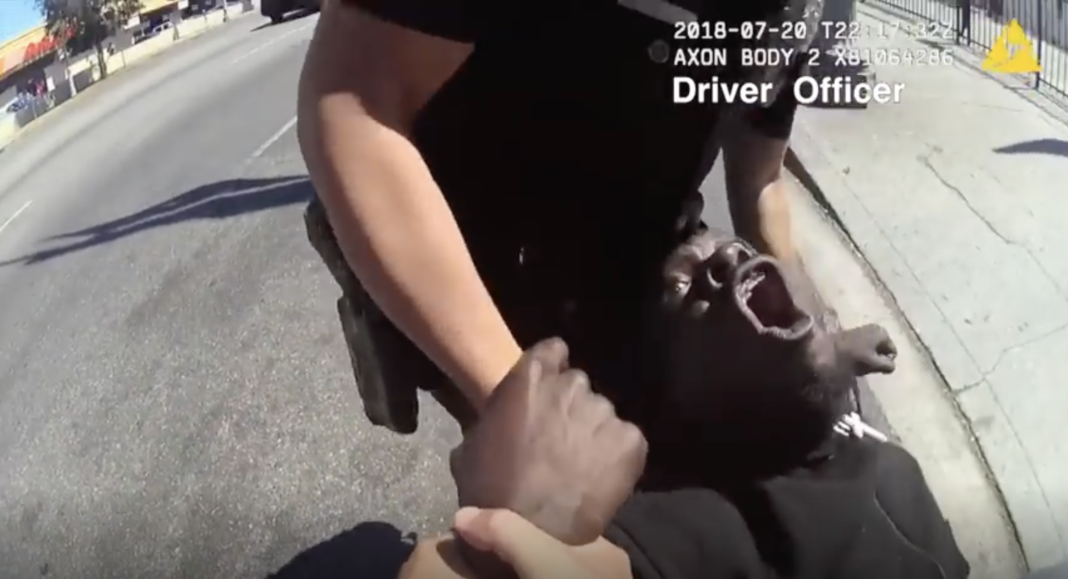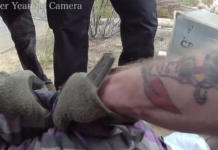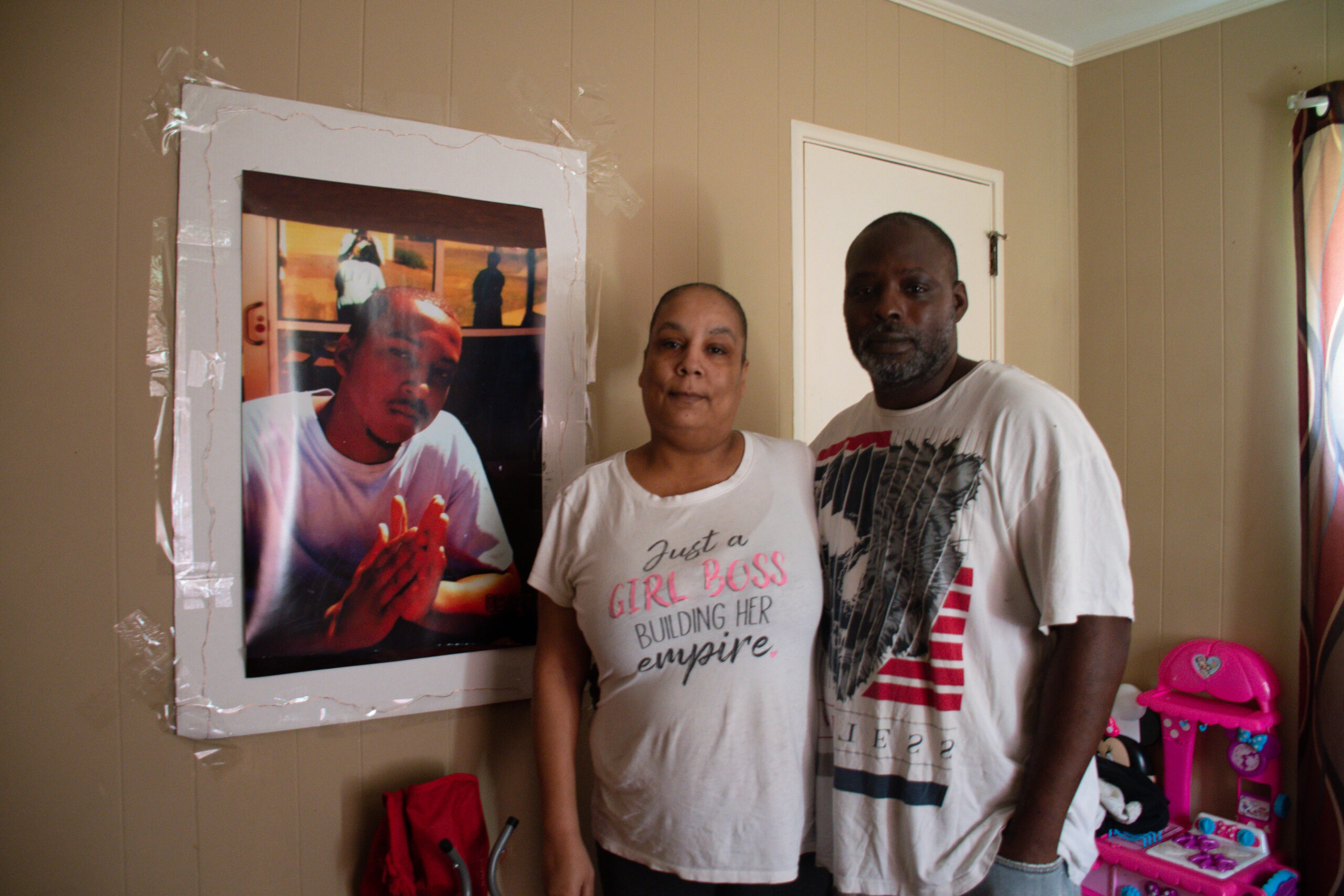
PHOENIX – Despite new laws intended to “pierce the secrecy” protecting California police officers, law enforcement agencies have thwarted those who seek information on cases of alleged misconduct – in some instances battling requesters in court.
And some basic personnel records – including complaints and disciplinary action against officers – are still hidden from the public, accessible only when a California judge grants access to them.
California, considered one of the most progressive states in the nation, had at least 198 non-shooting deaths from 2012 through 2021 after police used force that isn’t supposed to be deadly — the most documented in any state in the nation, an investigation by the Howard Center for Investigative Journalism, in conjunction with The Associated Press, found. The investigation identified 1,036 deaths across the country during that time frame, though suppression of information means the numbers are likely an undercount.

Yet, California law enforcement officers for decades have had their on-duty actions veiled by some of the strongest privacy protections in the country. In 2018, the American Civil Liberties Union called California “one of the most secretive states in the nation” in terms of “officer misconduct and deadly use of force.”
“Police officers are given enormous power,” said David Loy, legal director of the First Amendment Coalition, a nonprofit that consults with media organizations and other members of the public to advocate for greater government transparency. “The public has an overwhelming interest in understanding and knowing why, how and when police officers exercised that extreme power.”
California has passed a series of bills in recent years designed to give the public the right to records related to certain actions by law enforcement officers, known as Senate Bill 1421 and Assembly Bill 748 in 2018, and Senate Bill 16 in 2021.
Law enforcement agencies across the state have since released previously confidential documents under an avalanche of records requests. But attempts at greater transparency surrounding claims of police misconduct continue to be stymied by departments and police unions throughout California.
“It has been a challenge to enforce the law as written,” Loy said in an interview with the Howard Center.
“I’m not saying all officers abuse their power,” he said. “But that is precisely what the public has a right to know and verify.”
A ‘landmark bill’
In 2018, the California Legislature passed Senate Bill 1421, opening for the first time certain records related to police misconduct, including investigations of officers involved in sexual assault, dishonesty and use-of-force incidents, such as shootings. Assembly Bill 748, also passed in 2018, made public video and audio recordings including body-worn camera footage.
With the passage of these bills, government-created documents related to alleged or real misbehavior by police were supposed to be made available to anyone on request. The laws opened to the public reports, investigations and records produced by police agencies or external investigating agencies, such as district attorneys, including interview transcripts, autopsy reports and disciplinary actions against officers.
California state Sen. Nancy Skinner, who authored Senate Bill 1421, said it was intended to “help identify and prevent unjustified use of force, make officer misconduct an even rarer occurrence, and build trust in law enforcement.”
At the time, media organizations hailed it as a “landmark bill” and the ACLU said it would “pierce the secrecy that shrouds” law enforcement agencies.
“For the first time, certain categories of police records were disclosed to the public as a matter of right,” Loy said.
Gunita Singh is a staff attorney for the Washington, D.C.-based Reporters Committee for Freedom of the Press, which provides legal advice and resources for journalists nationwide. She told the Howard Center that California was “proactively looking at this issue” years before police reform legislation swept across the country in the wake of the highly publicized 2020 killing of George Floyd by Minneapolis police officers.
“California kind of beat everyone to the punch,” Singh said.
‘Massive resistance’
But when the new law took effect on Jan. 1, 2019 , and law enforcement agencies across California began receiving public records requests, they responded with what Loy called “a campaign of massive resistance.”
The Carlsbad Police Officers Association, for example, was one of several police unions and agencies that sued to block the release of records created before the new law took effect, arguing it did not retroactively apply to existing cases. The ACLU of San Diego and Imperial Counties, where Loy was the legal director at the time, argued that the bill applied to records regardless of when they were created.
Two months later, a San Diego County Superior Court Judge ruled against the police unions, joining several other similar court decisions that established records were eligible to be released regardless of when they were created.

In March 2019, a collaboration of California news outlets, computer scientists and lawyers joined together to request, litigate for, and report on the newly available police records. The collaboration, called the California Reporting Project, began with six newsrooms, including San Francisco-based KQED, the Los Angeles Times and Pasadena-based KPCC, according to the group’s website.
The collaboration has since grown to include dozens of member newsrooms that have published hundreds of stories based on the newly available records. The Associated Press and the Howard Center are members of the California Reporting Project.
Even before it was passed, the police transparency bill faced opposition from numerous associations of district attorneys, sheriffs and police officers. The Los Angeles County Professional Peace Officer Association, in a 2018 Senate committee report, said “the release of officer records where the officer has been entirely within policy will give the misperception that there was ‘something wrong’ with the officer’s conduct.”
When an agency denies a request, options are limited in appealing the denial. Some municipalities have special administrative processes to review the request, such as San Francisco’s Sunshine Ordinance Task Force. But in many cases the only way forward is to file a lawsuit.
“Freedom of information laws are supposed to be self-executing in that you shouldn’t need to get a lawyer,” Loy said. “Not everyone can get access to legal counsel.”
Singh, who’s advised California journalists as part of the Reporters Committee legal hotline, said some agencies deny a request not because ”the agency is trying to be stubborn or obstinate,” but that “they just don’t understand the contours of the law, particularly in a context where maybe the law was recently changed.”
But Skinner, in a 2021 report to the state Senate Committee on Public Safety, said some cities went as far as destroying records prior to the January 1 effective date “to avoid producing responsive documents.”
At the time, records retention laws gave agencies the right to destroy complaint records that were more than five years old. Among the cities named by Skinner were Downey and Morgan Hill, whose representatives told the Howard Center the records were destroyed according to the cities’ retention schedule.
Skinner introduced her second bill, which became law in 2022, to broaden the types of police transparency records available to the public and to address some of the issues and confusion resulting from her first piece of legislation.
The law expanded the categories of public information to include excessive use-of-force cases, as well as unlawful searches and arrests, failures to intervene against other officers who use unreasonable force, and cases in which police officers showed discrimination against certain people based on characteristics, such as race, religion, sex or disability.
Skinner introduced the legislation after the killing of Floyd by Minneapolis Police, including Officer Derek Chauvin. She said that under her first transparency law, the records of someone like Chauvin, who had a history of using force, would have been exempt from disclosure.
Broad latitude
The 2022 law requires agencies to maintain complaints and any related reports or findings for at least five years if the complaints are determined to be unfounded – and at least 15 years if the findings are confirmed. The law also set a 45-day deadline for agencies to produce requested police records.
More recently, however, state lawmakers approved a measure that added other obstacles for people seeking records related to police misconduct.
A 2023 law made California’s Commission on Peace Officer Standards and Training exempt from disclosing records related to officers’ personnel files, misconduct records and other investigative materials of decertification cases. The state previously had required the commission to make those records public.
Now through Jan. 1, 2027, the commission is forwarding such requests back to the officer’s department, essentially giving the decision to release records back to local agencies that could be hurt by the release of any negative information. Civil rights and open government advocates had opposed the measure, arguing it would “deny promised transparency into the decertification process” and “take the state backward with respect to law enforcement transparency.”
When records aren’t specifically made disclosable by the new laws, agencies look to other state laws to determine whether to release officers’ records.

The Public Records Act, California’s body of law that covers the release of government information, carves out exemptions for personnel records. The California Penal Code, which covers criminal law and procedures, defines personnel records broadly as covering education and employment history, promotions, discipline and complaints. Officers’ personnel records can be accessed only through what’s called a Pitchess motion: a written request filed in court. Outside of court cases, these records, which can help establish patterns of conduct, are confidential and inaccessible.
The Public Records Act also gives law enforcement agencies broad latitude to keep records confidential based on their judgment that releasing the information “would constitute an unwarranted invasion of personal privacy.” Singh called this determination a “balancing act” but said she hoped public information officers would “err on the side of access.”
Loy said the new laws have “opened the door a crack” on police records, but “there’s still significant categories of personnel files that remain off limits to public disclosure.”
Current law also states that records don’t need to be released for “pending” or “active” investigations, and Loy said some agencies use this provision to continually delay disclosure of records. Other agencies interpreted language specifying the law applied to use of force which “resulted in death, or in great bodily injury” to conclude that if an officer’s use of force was not the sole cause of injury or death, the records were not public, Loy said.
“Officers have very difficult jobs,” Skinner said. “I can appreciate why just knowing what every single complaint the public might have made about an officer is maybe not so necessary to reveal.”
Skinner acknowledged the rollout of the new laws had some bumps, but claimed that agencies and courts have begun interpreting the laws as they were intended.
“The whole process is improving,” Skinner said. “Both the court cases going in the favor of the law, and the agencies just getting more used to having to respond.”
Reporter Taylor Stevens contributed to this story, which was produced by the Howard Center for Investigative Journalism at Arizona State University’s Walter Cronkite School of Journalism and Mass Communication. The Howard Center is an initiative of the Scripps Howard Fund in honor of the late news industry executive and pioneer Roy W. Howard. Contact us at howardcenter@asu.edu or on X (formerly Twitter) @HowardCenterASU.






